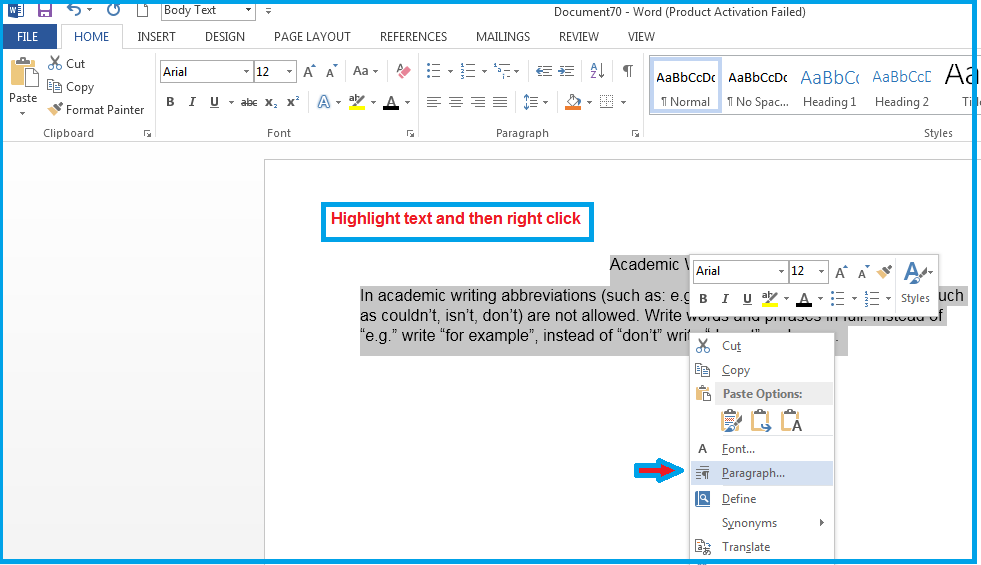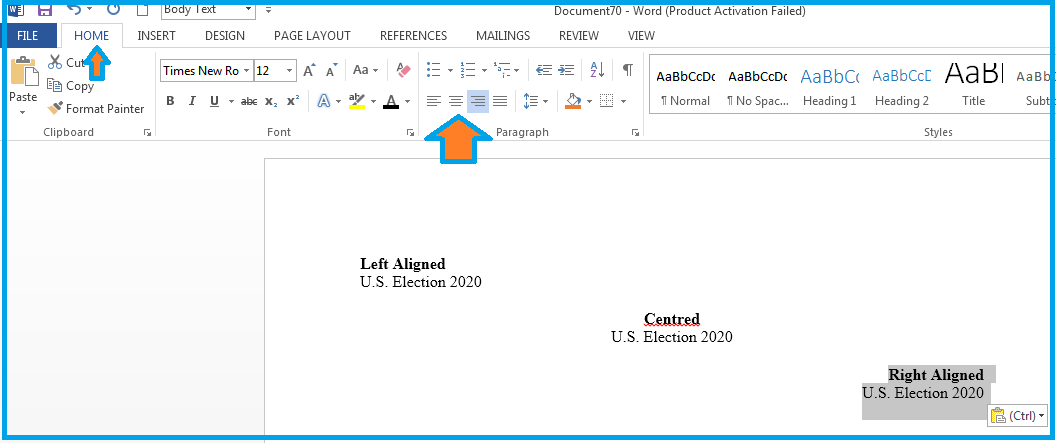Essay Formatting Introduction
One of the things that make an essay worth reading and professional is how it is formatted. Essay formatting is as important as the quality of content of the essay. This means that one way of improving the quality and score of your essay is by formatting it properly. It is thus important to learn essay formatting. But how do I format an essay? you may ask. You can learn formatting by reading formatting guides such as this essay formatting introduction article. This article presents an essay formatting introduction for students and those wishing to learn academic writing. This introduction to essay formatting provides the basic essay formatting rules that you should follow when writing an academic essay.
In case you are new to essay writing, here’s an introduction to academic writing.

What is essay formatting?
Before we delve into the simple essay formatting, let’s start by introducing formatting by answering the question: What is essay formatting? Imagine having to read a 10-page essay that is written using white font against a white background – you probably wouldn’t be able to read the essay content at all. Also imagine having to read a 10 page essay in which the size of the letters used is so tiny that squinting your eyes is of no use. Apart from taking ages to read the essay successfully, you would probably end up with strained eyes and a headache.
Once again, imagine having to read a 10-page essay in which all the words are written in capital letters – you will realise that such an essay is not as easy to read as one written mostly using lower case letters. Reading a lot of content written in lower case letters tends to be easier and more comfortable than reading content wholly written in capital letters. From these examples, you realise that there are things that can make reading the content of an essay easier, more comfortable, and faster.
There are certain fonts, font sizes, font colours, background colours, and other elements that have been found to make reading content easier, faster, more comfortable, and well organised. It is based on this knowledge that formatting guidelines, formatting styles, or referencing systems have been developed.
Formatting is how an essay is structured, laid out, and presented. Formatting has to do with such simple things as the font and font colours used, line spacing; paragraph spacing, the use of bold, italics, underlining, and highlighting. It also has to do more complex things such as whether and what to include in the title page, how to arrangement different things within the essay or document, what punctuation marks to use in separating the bibliographic information, how to show paragraphs, and how to present headings and subheadings. These are only a few examples of what essay formatting entails. Formatting is one of the essential skills for essay writing.
Why is essay formatting Important?
The way your essay is formatted affects how readable and organised your paper or document is. An essay that is well formatted is properly organised contributing to the logical flow of ideas within it. Formatting also contributes to the accurate and consistent citation of sources and lowers the risk of plagiarism. Formatting also makes your work more appealing to the eye of the reader and thus more inviting. An essay that is properly structured and presented looks attractive and is easy to read while one that is poor in its presentation can be unattractive and difficult to read. In college, an essay that is well formatted will likely attract a better grade than one that is not so well formatted if the two essays contain equally good content.

Formatting additionally reflects the professionalism of your work and effort especially when you apply the formatting style (such as APA, MLA, Harvard, or Chicago) prescribed by your institution or client. APA stands for American Psychological Association while MLA stands for Modern Language Association. As a student, you don’t need to learn or master all these formatting styles. You only need to learn the formatting style that is relevant to your course or institution.
As you can see, you have every reason to learn how to format an essay as a college student or someone interested in learning academic writing.
Simple Essay Formatting
Essay formatting touches on so many aspects of the essay. Additionally, there are different ways of formatting an essay as established by organisations such as APA, MLA, and Harvard. The formatting styles created by these organisations share some rules in common. This essay formatting introduction is good for learning simple essay formatting and contains rules that are mostly shared by different formatting styles. It contains some general formatting guidelines that you will like to follow and build upon as you develop your formatting and other essay writing skills.
Simple Essay Formatting Rules
In a past article, we have covered some basic rules for writing which you should follow when writing an academic essay. Here, we outline simple essay formatting rules that you should follow in structuring your essay to make it look presentable, professional, and is easy and comfortable to read. Of course you should give precedence to the instructions of your institution, organisation, or format guide over the rules outlined in this article. Here are the essay formatting rules.
1. Always provide a title in your essay. Title case (only first letter of every main word is capitalised) is usually applied when writing the title. Do not put a full stop after your title since it is not a sentence.
2. Do not underline your title, headings or subheadings. Italics are only used in certain subheadings and in some special cases.
3. When writing the title, don’t precede it with words such as “Title:”. Also, don’t put a colon (:), semicolon (;), full stop (.) or dash (-) after at the end of a title, heading, or subheading.
|
Inappropriate |
Appropriate |
|
Title: U.S. Elections 2020 |
U.S. Elections 2020 |
|
U.S. Elections 2020: |
Influence of Employee Motivation on Work Performance |
|
U.S. Elections 2020; |
|
|
U.S. Elections 2020. |
|
|
U.S. Elections 2020- |
|
|
U.S. Elections 2020:- |
|
|
Influence of Employee Motivation on Work Performance. |
|
4. Do not capitalise the title of your paper (Do not use all caps). Use title case (Only the first letter of every main word is in capital letters).
Inappropriate (title):
HISTORY OF THE UNITED STATES OF AMERICA
INFLUENCE OF EMPLOYEE MOTIVATION ON WORK PERFORMANCE
Influence of employee motivation on work performance
Appropriate (title, title case):
History of the United States of America
Influence of Employee Motivation on Work Performance
Note: “of” “on” and “the” are not capitalised since they are not main words; they are words commonly used in the English language so they don’t qualify to be main words. Other words that don’t qualify to be capitalised in the title include: is, and, in, of, be, for.
5. For short essays (1-2 pages), you may not need to include headings and subheadings. However, when writing longer essays, it is important to divide your paper into sections using headings and if necessary subheadings. Using headings and subheadings to divide your paper improves its readability and serves to tell the reader what to expect in the paragraphs that follow the heading/subheading.
6. Never begin a sentence with numerals (1, 2, 3, 4, 100 etc) (No exceptions). You may, however, begin a sentence by writing a number in words.
Inappropriate:
50 people got into the boat and sailed across the river.
2020 was the year in which the corona virus pandemic began.
15% of the Kenyan population lives in poverty
Appropriate:
Fifty people jumped into the boat and sailed across the river.
Approximately 15% of the Kenyan population lives in poverty.
The corona virus pandemic began in 2020.
It is in 2020 that the corona virus pandemic began
7. When writing numbers in the body of your paper, always write numbers (integers) below 10 (0-9) in words. This rule, however, may be ignored when dealing with decimal numbers and special units such as currencies, percentages, time, and dates.
Inappropriate:
When Moses got to the den, he found 3 people eating mangoes.
According to the government, 9 percent of the population lives in poverty.
According to the government, nine % of the population lives in poverty.
Appropriate:
When Moses got to the den, he found three people eating mangoes.
Currently, the exchange rate is Ksh. 100 per $1.
According to the government, nine percent of the population lives in poverty.
According to the government, 9.0% of the population lives in poverty.
According to the government, $2 billion was spent during the pandemic.
Jack found the distance between the door and the frame to be 2.54 cm.
8. Avoid fancy fonts and use an appropriate font size. Times New Roman is the most preferred font (font size 12). Other preferred fonts are Arial (font size 11) and Calibri (font size 12).
9. Your text should be in black (automatic) colour (perhaps with the exception of hyperlinks/URLs that appear on the references page). Ensure the shade of colour used is the same (for example, do not mix grey and black).
10. Unless otherwise specified, double space your work (set line spacing to double). To do so in Microsoft Word, highlight all the words of your essay, right click on the highlighted part. A dialogue box appears. Under line spacing, choose “Double”).


11. In academic writing abbreviations (such as: e.g., etc, i.e.) and contracted words (such as couldn’t, isn’t, don’t) are not allowed. Write words and phrases in full. Instead of “e.g.” write “for example”, instead of “don’t” write “do not” and so on.
12. Acronyms (such as U.N., W.H.O., U.S., E.U.) may be included in your essay. However, you must always write the name in full followed by the acronym in its first appearance in the body of your essay. If you opt to use periods (full stops) between the letters of your acronym, do this consistently. If you opt not to insert periods between the letters, apply this option throughout your essay.
According to the World Health Organisation (W.H.O.) , ….
According to the World Health Organisation (WHO) , ….
The United Nations (U.N.) was established in 1945.
The United Nations (UN) was established in 1945.
13. Set your page margins to 1 inch all round (All margins (left, right, top and bottom) should be set to 1″ or 2.54 cm). On MS Word 2007 and other newer versions, this is the default setting. However, here’s how to set page margins:
On MS word, click on “Page Layout” Menu, on the left hand side of your screen at the top, you will see “Margins”. Choose “Normal”. Alternatively, choose custom margins and set the margins to 1″ (or 2.54  cm).
cm).
Here is the procedure for setting custom margins to 1″ all round:

14. Insert page numbers in your paper. Page numbers are mostly inserted in the top right-hand corner of the page and are mostly numbered using Arabic numerals (1, 2, 3 ….100).
To insert page numbers in Word, go to the “Insert” menu. Look for “Page Numbers” it is somewhere just past the middle of the toolbars. Click on it and Choose “Top of the Page”. Again choose “Plain number 3.”

15. Do not leave blank lines or spaces between your title/headings/ subheadings and paragraphs. Likewise, don’t leave blank spaces between paragraphs and headings/subheadings. Similarly, leave no spaces between your paragraphs.
16. Your paragraphs should be left aligned or justified (depending on the format style you are using). Always centre your title unless otherwise stated. Always use the centre align tool on your word processor (rather than the space bar or tab button on your keyboard) to centre words, titles, and other items. When you use the tab button and space bar to centre words or items, the words will most likely not be accurately centred.
Left Aligned
U.S. Election 2020
Centred
U.S. Election 2020
Right Aligned
U.S. Election 2020
Here is how to align text in Word:

17. In the body of your text generally avoid using the colon (:). Using the colon in your essay tends to encourage writing in point form.
18. Always ensure that you remove unnecessary hyperlinks or links from words, names, and titles in the paper and in the references page. To remove a hyperlink from a word or phrase, right click on the word or phrase and choose “Remove hyperlink”.
19. Unless specifically instructed to, do not include tables, images, and figures, (maps, photographs, charts, drawings etc) in short academic papers. You may, however, include these in longer papers such as proposals, dissertations/theses, and systematic reviews.
20 Always credit people with their contributions, perspectives and views. In other words, attribute ideas, facts, studies, arguments, research findings, definitions, statistics, etc to specific persons or organisations.
21. Always reference your work. References are basically the sources from which you got information to write your essay content. The entries in the references depend on the referencing style (MLA, APA, Harvard, Chicago etc) and the type of source you are referencing. The references or sources are usually entered on a new page after the conclusion under the heading “References”, “Works Cited”, or “Bibliography” (without the quotation marks), depending on the formatting/referencing style you choose to use.
How much should you know to write an essay on a given subject?
22. Follow a punctuation mark with one space (insert one space between a punctuation mark and the next letter. Inserting two spaces after a punctuation mark is acceptable in some formats.
Inappropriate (spacing mistakes):
Several changes have been implemented following the 9/11 terrorist attack.For one,people have been subjected to more frequent and more thorough security checks.
Appropriate:
Several changes have been implemented following the 9/11 terrorist attack. For one, people have been subjected to more frequent and more thorough security checks.
Final Words
This article is an essay formatting introduction for college students and people who wish to learn academic writing. Academic essays and papers should be presented in a manner that makes them easy to read and comfortable to the eye, and professional, which is what formatting is about. The reader should be able to read the work quickly and be able to find the sources from which ideas or information has been drawn.
As stated earlier in this essay formatting introduction, essay formatting has to do with how your essay is structured, laid out, and presented. Essay formatting is important as it shapes how well your essay is organised and appealing to the reader. Essay formatting also reflects the professionalism of your work and potentially influences your essay score.
We have so far covered the basics of formatting. Later, we will go into greater depth by discussing a few of the formatting styles that are commonly used in academic writing. Formatting styles are also called referencing styles, referencing systems, or citation styles. Some of the most commonly applied formatting styles are APA referencing style, MLA referencing style, Harvard referencing system and Chicago referencing style. As a student, you don’t need to learn all the referencing styles mentioned in this essay formatting introduction; you only need to learn the referencing style that is relevant to your course or university.
 Mastering the basic rules of academic writing is key to crafting insightful, clear, and well-structured essays. Understanding these essential essay writing rules can transform your writing, improving clarity and professionalism while helping you develop strong, persuasive arguments. Understanding and applying these rules will help you write a great essay. Do you want to learn the rules for writing a great essay? Here’s a simple guide to the essential rules for essay writing and
Mastering the basic rules of academic writing is key to crafting insightful, clear, and well-structured essays. Understanding these essential essay writing rules can transform your writing, improving clarity and professionalism while helping you develop strong, persuasive arguments. Understanding and applying these rules will help you write a great essay. Do you want to learn the rules for writing a great essay? Here’s a simple guide to the essential rules for essay writing and  Writing one or more definitions to a concept is a common thing in academic writing. When defining a term, concept, or construct, present professional definitions and not definitions based purely on your own thoughts. You may come up with a definition that combine elements of the definitions of two or more professionals.
Writing one or more definitions to a concept is a common thing in academic writing. When defining a term, concept, or construct, present professional definitions and not definitions based purely on your own thoughts. You may come up with a definition that combine elements of the definitions of two or more professionals.


 Avoid asking questions that you expect the reader to answer. Understand that you are supposed to be answering a question, not asking your reader or instructor questions, which may demonstrate your lack of knowledge. Here’s
Avoid asking questions that you expect the reader to answer. Understand that you are supposed to be answering a question, not asking your reader or instructor questions, which may demonstrate your lack of knowledge. Here’s 
 A common question in the minds of many students, budding professionals, and people wishing to
A common question in the minds of many students, budding professionals, and people wishing to 


 With respect to quality content, your essay should answer the question that you are supposed to answer, which means that the content of your essay should be relevant. The content of your essay should also be based on sound reasoning or logic, founded on sound research, and should present different viewpoints and arguments. Here’s
With respect to quality content, your essay should answer the question that you are supposed to answer, which means that the content of your essay should be relevant. The content of your essay should also be based on sound reasoning or logic, founded on sound research, and should present different viewpoints and arguments. Here’s  Closely related to language proficiency is paraphrasing skills. Academic writing involves drawing information from different sources and writing this information in your own words. The ability to understand what others are communicating and express the same ideas in your own words is, therefore, an invaluable skill. Paraphrasing involves analysing and reinterpreting other people’s ideas. Your ability to effectively paraphrase the information that you have gotten from other sources can help you avoid or reduce the risk of plagiarism. Avoiding plagiarism is crucial in academic writing as originality and proper source attribution are required. Being able to rephrase what others sources have stated demonstrates your understanding of the material, which often leads to better insights and stronger arguments. Having effective paraphrasing skills additionally helps you seamlessly blend sources into your narrative, which translates to better essay flow, and helps translate complex ideas into powerful statements that support your arguments and thesis.
Closely related to language proficiency is paraphrasing skills. Academic writing involves drawing information from different sources and writing this information in your own words. The ability to understand what others are communicating and express the same ideas in your own words is, therefore, an invaluable skill. Paraphrasing involves analysing and reinterpreting other people’s ideas. Your ability to effectively paraphrase the information that you have gotten from other sources can help you avoid or reduce the risk of plagiarism. Avoiding plagiarism is crucial in academic writing as originality and proper source attribution are required. Being able to rephrase what others sources have stated demonstrates your understanding of the material, which often leads to better insights and stronger arguments. Having effective paraphrasing skills additionally helps you seamlessly blend sources into your narrative, which translates to better essay flow, and helps translate complex ideas into powerful statements that support your arguments and thesis. Academic writing mostly involves researching online and typing your work on a word processor (such as Microsoft Word or Google Docs). It is, therefore, important that you have at least basic knowledge of how to use the computer and the Internet. This means you need basic knowledge on how to use a word processor and a browser – such as Mozilla Firefox, Google Chrome, or Internet Explorer – to access and find information on the Internet. Having knowledge and experience in using word processing software can make drafting, editing, and formatting your work easier and helps you work more efficiently. Tools such as spell check, grammar suggestion, formatting options, review options, QuillBot, Grammarly and Hemingway help save time, avoid or correct certain errors, and enhance the clarity, readability, and professionalism of your essay. Proficiency in the use of other software (such as statistical, spreadsheet, project management, computer programming) can be an added advantage to you especially if your essay work requires complex data analysis or decision making.
Academic writing mostly involves researching online and typing your work on a word processor (such as Microsoft Word or Google Docs). It is, therefore, important that you have at least basic knowledge of how to use the computer and the Internet. This means you need basic knowledge on how to use a word processor and a browser – such as Mozilla Firefox, Google Chrome, or Internet Explorer – to access and find information on the Internet. Having knowledge and experience in using word processing software can make drafting, editing, and formatting your work easier and helps you work more efficiently. Tools such as spell check, grammar suggestion, formatting options, review options, QuillBot, Grammarly and Hemingway help save time, avoid or correct certain errors, and enhance the clarity, readability, and professionalism of your essay. Proficiency in the use of other software (such as statistical, spreadsheet, project management, computer programming) can be an added advantage to you especially if your essay work requires complex data analysis or decision making. Strong research skills are important skills for essay writing, as academic essays require credible, well-researched sources. In academic writing, you will not just engage in superficial Internet search. You will have to engage in deep research as you
Strong research skills are important skills for essay writing, as academic essays require credible, well-researched sources. In academic writing, you will not just engage in superficial Internet search. You will have to engage in deep research as you  Formatting is another one of the several skills needed for essay writing. Formatting has to do with the organisation and presentation of your essay. An essay that is well formatted is well organised, easy to read and understand, has good flow and looks professional. Having formatting skills requires attention to detail and demonstrates respect for formatting guidelines and conventions. Having good formatting skills helps you properly organise and format your essay or paper enhancing its readability, flow, and presentation, and appeal to the reader.
Formatting is another one of the several skills needed for essay writing. Formatting has to do with the organisation and presentation of your essay. An essay that is well formatted is well organised, easy to read and understand, has good flow and looks professional. Having formatting skills requires attention to detail and demonstrates respect for formatting guidelines and conventions. Having good formatting skills helps you properly organise and format your essay or paper enhancing its readability, flow, and presentation, and appeal to the reader.


 grades in school or college. This is because academic writing helps you develop strong communication, language, reasoning and critical thinking, and research skills, all of which are necessary for good or excellent academic performance. In addition, by engaging in academic writing, you develop the ability to understand audiences and reach them better and increase your knowledge on different subjects.
grades in school or college. This is because academic writing helps you develop strong communication, language, reasoning and critical thinking, and research skills, all of which are necessary for good or excellent academic performance. In addition, by engaging in academic writing, you develop the ability to understand audiences and reach them better and increase your knowledge on different subjects.